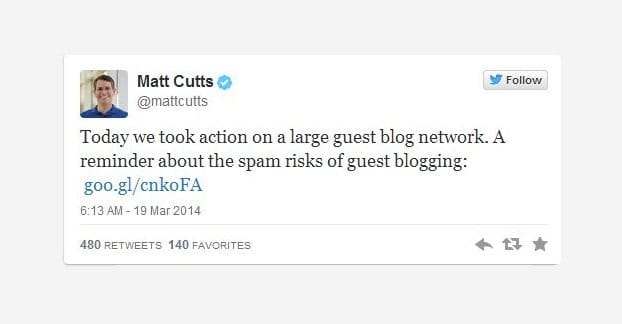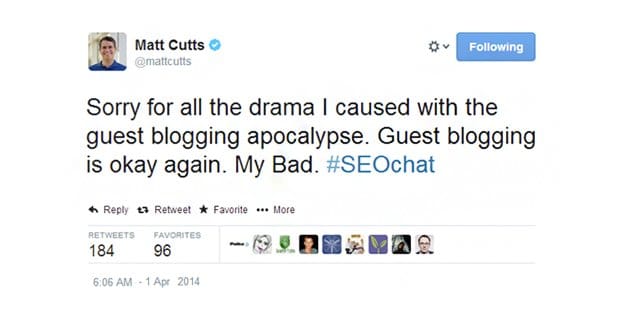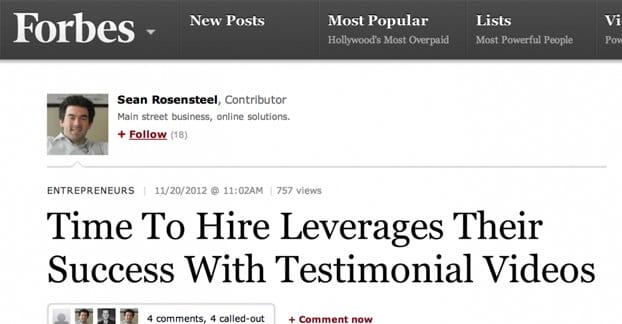Google doesn’t like money having an influence on SEO. There’s not a lot they can do about it, of course; money means the ability to pay for the best tools and hire the best people, invest in better audits and larger infrastructures, and it gives large companies access to avenues others might not, like partnerships with other large companies or events.
That said, Google does devalue certain techniques where money might be involved. Sometimes it’s as simple as hurting sites that pay for links, and sometimes it’s more like the casual pressure they put on guest posting.
Google generally doesn’t like when you pay for a guest post position. Getting paid for a guest post is fine; paying for the ability to write one is not. Generally Google will end up penalizing the sites that accept money for it, but if they find that you’re repeatedly paying for guest posts, they might devalue all of those links.
The reasoning is pretty simple; if they let those links stand, a big company could buy 1,000 links where a small company might only afford 10. Since links are foundational to how search engines work, that means the bigger company can literally buy their way to the top.
Does the pressure work? Sure, sometimes. A lot of small and mid-sized companies are hesitant to do anything that could earn them a penalty, because businesses at that level tend to be rather fragile. A shift in the market, a sudden loss of rankings, these things can cause a pretty steep drop in profits and lead to layoffs, thin quarters, or even the collapse of the business entirely.
The problem is, large companies with huge sites, huge reputations, and huge bankrolls are able to skirt around a lot of rules. The stereotype is taking advantage of ridiculous global tax loopholes and such, but they also have a lot of resilience to search engine penalties.
If Nike goes out and buys a bunch of guest posts on sites like Forbes or the New York Times or what have you, what is Google going to do? They can devalue those links, they could even hurt the Nike website, but the Nike brand is far too strong for Google to tangibly hurt. Even a complete de-listing wouldn’t stop the brand, they get plenty of direct traffic and plenty of paid traffic. It’s not like Google can just label Forbes as having bad links, either; the site is too large and too high quality to simply remove.
Of course, this is all hypothetical; do these large companies really do all this?
Yes, of course. In what world do you think we live, where big companies wouldn’t take advantage of a loophole that allows them to get ahead? I can’t name any names, and I’m not personally involved in the illicit guest post market, but I know people who work for some of the top 10 major blogs and guest posting agencies. Let me tell you; there are very few companies in the Fortune 500 that don’t have recurring plans buying guest posts all over the web, particularly in larger sites and networks.
Guest Posting Was Never Dead
Matt Cutts wrote that famous post about the decline and fall of guest blogging for SEO. I’m sure this thing has about a billion backlinks at this point. The intent of the post was to reveal some internal processes within Google, both happening and on the way, that were aimed at devaluing bad guest posts.
(Ok, this tweet isn’t real, its a joke).
Since the publication of that article in January of 2014, there has been a lot of back-and-forth in the SEO community. Some people argue that this meant the entire guest posting industry was dead. Obviously it hasn’t shaken out that way, what with things like the site you’re reading now existing at all. Other people, myself included, argue that it simply meant that spammy, mass-solicitation guest posts are no longer a viable technique. All those widespread “send out this single pitch to 1,000 websites” emails are dead.
Of course, how many of you actually accepted a guest post from one of those emails anyway? They were universally terrible even before Google took action. And indeed, if you read the blog post from Matt up there, his example doesn’t even call out the guest post itself; it calls out the offer of a suitable contribution and the requirement of a followed link. In other words, paying for a link you didn’t earn. All the stuff about the guest post being unique and high quality, that’s all cloaking for the real transaction.
I can tell you right now, all those big companies in the Fortune 500 that were buying guest blog links back in 2012 and 2013? None of them gave a hoot when Matt Cutts published this blog post. They’ve continued their practice, kept on buying guest post links, and absolutely nothing has changed for them. They’re literally too big to care about the whims of Google search results; the sheer force of their brand recognition outweighs just about any possible penalty Google could leverage.
The Fault In Our Searches
Google has been trying a lot over the years to level the playing field as much as possible. I have to give them credit for creating an environment where small blogs and small bloggers can find a niche. It’s possible for small businesses to get started without some kind of Shark Tank style venture capital funding in the millions or the heavy hand of an investor giving them a huge pile of influence and social capital.
However, a lot of restrictions still more or less only apply to small and mid-sized businesses. How much do you think Forbes has to care about the quality of their backlinks? The biggest negative SEO bomb in the world wouldn’t be able to hurt their rankings. How much do they have to care about keywords? None, because anything they write about is suddenly relevant to their site, rather than needing to carefully choose what they write about to stay relevant to their niche.
How much do you think they have to care about guest post restrictions? None, really. They can have an existing author publish content paid for by a Fortune 500 company and be completely fine. The writer might not even know it was sponsored; the editor would, but neither of them necessarily sees a hint of the cash. Or maybe they do, I don’t know, I don’t run a massive company that can take guest posts and their associated payments in that manner.
The point is, there’s no penalty that Google could leverage against a site like Forbes or a company like Nike that would hurt them short of entirely delisting them from search results, banning them from ads and from associated sites like YouTube, and basically going full tyranny with the nuclear option. Google would never do that so they’re safe.
Don’t think I’m just singling out Forbes and Nike here; they’re hypothetical examples of the categories of businesses I’m talking about, not specific examples of businesses I know engage in this practice.
The point is, while Google has done a lot to give small businesses a chance to succeed, there’s not a lot they can do in a corresponding way to suppress the excesses of large brands. They only have so much power, after all, and the precedent of a fair playing field has been established too well to break it now.
What we have, then, is a world where the rules Google puts forth simply don’t apply to the biggest names around. Which, you know, makes sense, since that’s how it works everywhere else. When big global companies can move their headquarters label and a few dozen employees to another country to avoid taxes, where companies can be owned by other companies which are owned by other companies so far up a chain that it’s impossible to punish them, where single rich dynasties can essentially purchase governmental roles… it’s a troubling world we live in, all the same.
There’s also a slightly more insidious aspect to this whole arrangement as well. Take a site like Forbes; what are the chances that a link from Forbes is going to be a spam link? They pay lip service to nofollow directives, of course, but Google doesn’t have a good way to determine the source of the link and whether it’s spam or a good link or somewhere in between. Google is less likely to even investigate these large sites to see if they’re violating rules, in part simply because they can’t do much even if they are.
Google’s penalties and rules are focused at keeping small sites from reaching a level where they’re too big to fail, through using “evil” techniques. They’re gatekeepers of the ultra-success zone. In a sense, they’re The Man keeping the rest of us Little People down. It’s not their intent, and they certainly could make it a much, much more challenging environment, but even so. Such is the world in which we live.
How to Become the Ultra Successful
Since Google’s rules primarily apply to businesses like you and me, we have to pay attention to them and do everything right, within our power. We can’t exploit wide-ranging spam-like guest post pitches. We can’t pay a few grand to get our links focused on big name sites time and time again. We can’t forge large partnerships with huge sites, since we don’t have enough to offer them.
What we need to do is work within Google’s own system to climb the ladder. Use money for guest posts sparingly, and only when you’re sure it won’t be discovered. Make sure every link you get is as high quality as possible, and make heavy use of tools like Majestic to audit your backlinks for quality and breadth of profile.
Guest posting has a handful of different, interrelated goals for marketing.
- It can bring in traffic from sources you don’t normally get it, which can build your audience.
- It gets your name and the name of your brand in front of more people. Wider brand recognition means that people associate you and your product with some remembered value. If the choice is between a brand they’ve heard of and a brand they haven’t, they will almost always choose the one they have heard of, unless they clearly associate it with intense negative reviews.
- It gets you a link from another new source. Even if that link doesn’t pass traffic, it becomes part of your link portfolio. Link profiles should be both deep and broad, so getting links from new domains is generally a good thing. Assuming, of course, those sites are not spammy in nature.
- Another note on links, even nofollowed links can be valuable. They still exist for the purposes of traffic, and Google can still see that they exist, they just don’t pass rank. You can still gain some value from them, and if implied links become more important, you get that benefit as well.
- It spreads your content around. By growing a reputation as a producer of high quality content, people associate you with quality and it can open up more opportunities. Google still keeps track of the quality level produced by various content creators, even if formalized programs like Authorship are dead.
As long as a guest post opportunity fulfills at least one of those purposes, and isn’t actively detrimental to any other, it’s worth pursuing. In general, though, you will want to focus on post opportunities that cover as many bases as possible. That’s the quality over quantity emphasis you might expect. One day, you might be able to grow to a point where you don’t have to worry about these things, or at least you can pay someone else to do the worrying for you. Until then, well, why not check out the rest of this blog?
 ContentPowered.com
ContentPowered.com







